When Dave Eggers published The Every in 2021, it couldn’t have cut closer to the bone. A saga of Big Tech gone very wrong, taking place in a world ravaged by pandemic and economic upheaval, the novel involves two friends who concoct a plan to undermine a digital behemoth named the Every, which has made itself ubiquitous. For a sense of scale, think Facebook crossed with Amazon, Google, and Apple—a company that controls the means of production and of distribution and uses them to enforce its own polity. Surveillance is required, for our own good. Public shaming keeps us in line. God is dead, or resurrected in a social network. Identity is just a word.
This article appears in Issue 26 of Alta Journal.
SUBSCRIBE
Two years later, with ChatGPT in the discourse and the website formerly known as Twitter becoming more toxic and hateful by the hour, The Every has taken on a more complex set of associations: To wit, what do we do when technology outstrips our imagination? What do we do when the last grown-up has left the room? For Eggers, such questions have been in play for some time. His 2013 novel, The Circle, explores an eponymous social media company that is evangelical in its embrace of intrusive technologies. “Secrets are lies; sharing is caring; privacy is theft” is a corporate mantra. The nod to Orwell—“war is peace. freedom is slavery. ignorance is strength”—is as pointed as it is distinct. The Every comes framed as a sequel to The Circle. Yet to read it only through the lens of this relationship is to miss what Eggers has in mind. His purpose is not only to expand the story. It is also to launch a blistering critique. “We are a species in contraction,” he writes. “A species that sits still, in a circle, staring at each other, cannot survive. We sit in constant judgment of each other, and thus we are a species in decline. Nothing great can be created in such a climate. An authentic human life cannot be lived this way.”
Authenticity, of course, has long been a focal point for Eggers. Think of his debut, A Heartbreaking Work of Staggering Genius, a self-portrait of the artist as a young guardian, raising his younger brother after their parents’ deaths. Think of what he’s accomplished at 826 and McSweeney’s. Think of his advocacy work.
For Eggers, authenticity cannot be quantified. It exists on its own terms or not at all. Metrics are its antithesis. It cannot be shared or liked. Rather, it embraces the messy, the unpredictable, the untamed—our essential humanness, in other words.
The irony is that throughout The Every, the biggest threats grow out of what appear to be good intentions: the desire to feel protected; to find security, community. These longings, too, are human fundamentals, which is the moral argument Eggers means to make. As for technology, security is never what it offers, all assurances aside. Just look at where we find ourselves, in the perilous dystopia of the emerging singularity.•













